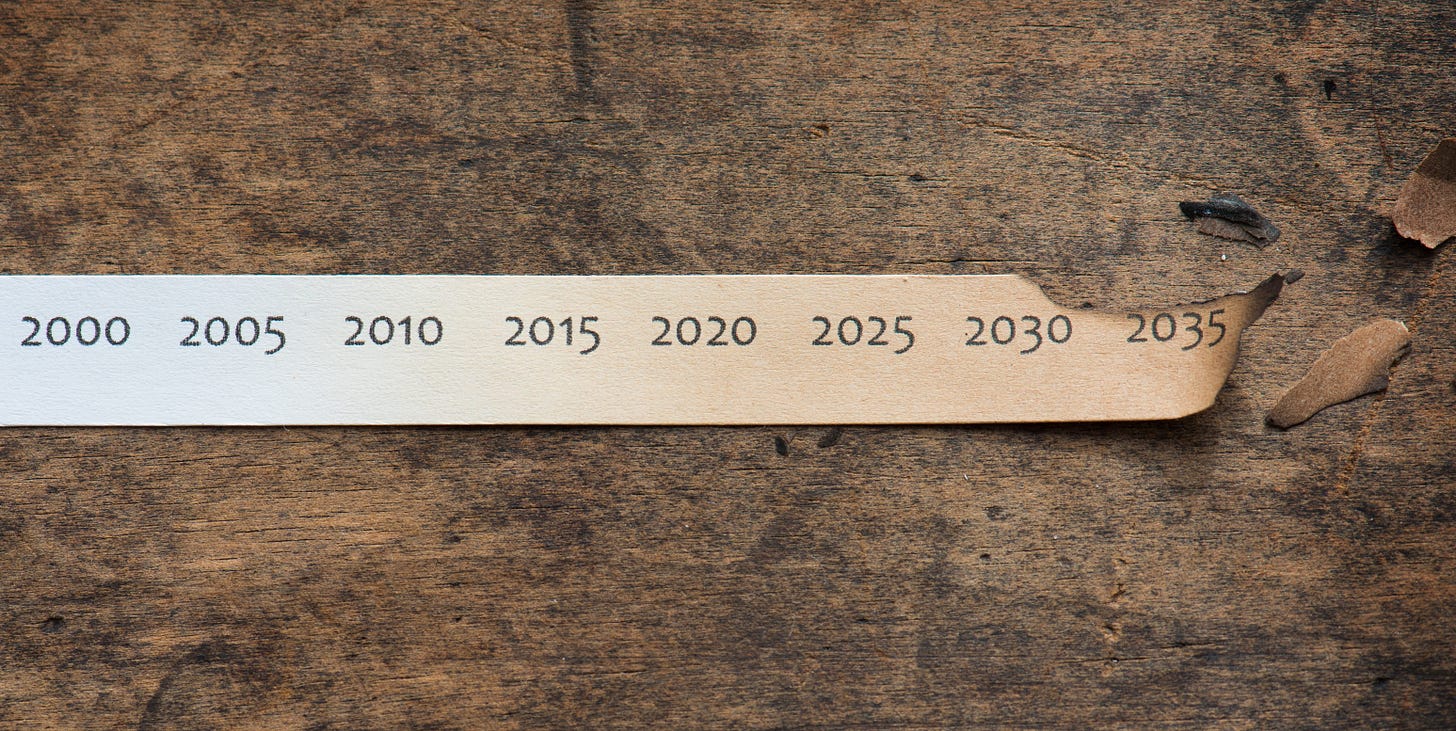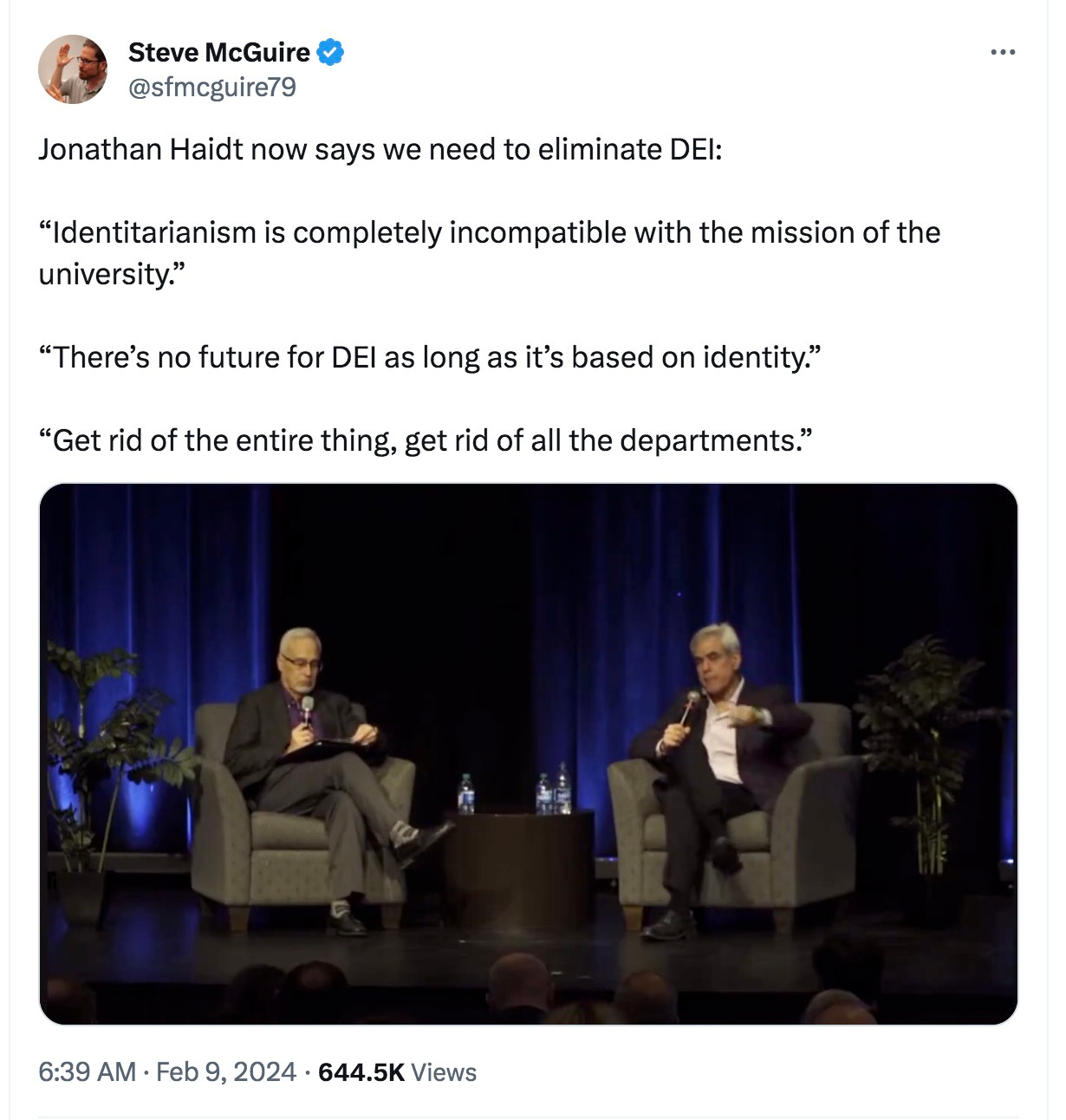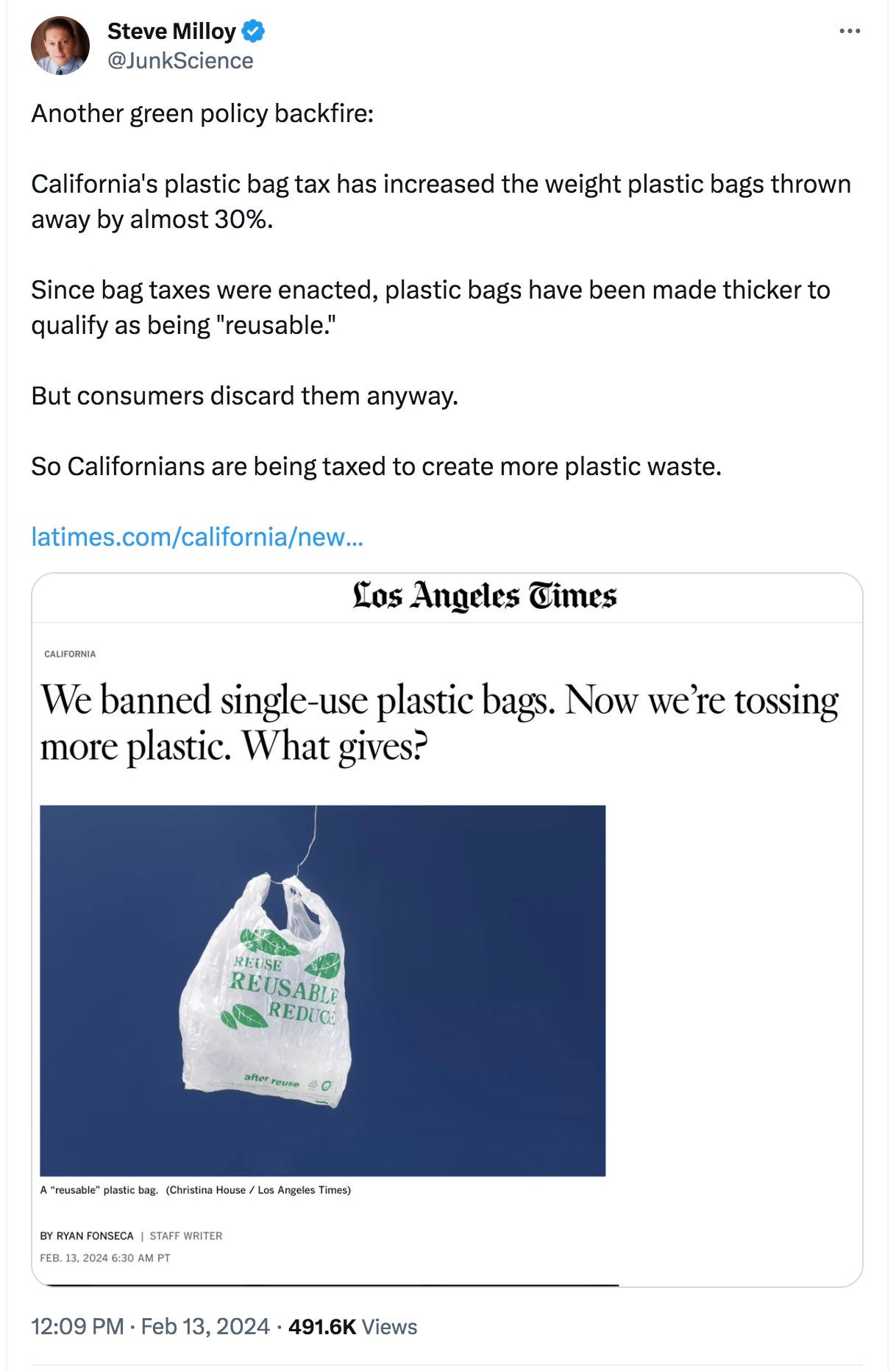E-Pluribus | February 14, 2024
The slow but welcome return of merit in college admissions; the rise and fall of American democracy; and keeping the dream alive.
A round-up of the latest and best musings on the rise of illiberalism in the public discourse:
Seth Moskowitz: A Comeback For Merit In College Admissions
There may be plenty of bad reasons for letting young people into college, but merit isn’t one of them. Although there’s not exactly a stampede yet, Seth Moskowitz writes at Persuasion that there is some reason for optimism that colleges are recognizing the value of testing the fitness of applicants for the higher educational experience.
At the start of the pandemic, many undergraduate universities in the United States eliminated the requirement that applicants submit an SAT or ACT score.
[. . .]
The initial pandemic-related reason for test-optional changes made perfect sense, but any rationale that relied on the principles of diversity or social justice was always misguided. Far from being an engine for inequality, standardized tests like the SAT and ACT are a leveling device. It is true that scores tend to vary by class and race, but those variations are a reflection of broader inequalities rather than evidence that the test is biased.
The same cannot be said for any other aspect of the application packet, which can, to some extent, be bought and paid for. A privileged student might be able to afford impressive extracurricular and leadership activities, hire an editor to help craft their personal statement, or attend a private school with more attentive college counselors—but they cannot purchase a good SAT score. And while test preparation services can have an impact on test scores, and are more available to wealthy students with the requisite resources and time, there are free preparation programs available—and in any case, experts believe the rich-student advantage in test preparation is “very small” to begin with. As Elizabeth Currid-Halkett, professor of public policy at the University of Southern California puts it, standardized tests are one of “the only remotely ‘objective’ measures of performance that our brilliant pupils of all backgrounds have.”
For over three years, most colleges seemed to have abandoned the idea of ever returning to mandatory testing. That is, until Monday, when Dartmouth College announced that it would be reinstating its testing requirement next year. This decision followed a report by four Dartmouth professors showing that standardized test scores “are significantly predictive of academic success at Dartmouth and increase the likelihood that Admissions will be positioned to identify high-achieving less-advantaged applicants.” This change has so far happened at only a handful of well-known schools (MIT also reinstated mandatory testing back in 2022), but the fact that they are among the country’s most prestigious academic institutions is a sign that other schools may soon begin to reconsider the merits of mandatory testing as well.
Read it all.
Matt Johnson: Chaos at the End of History
While some have viewed Francis Fukuyama’s The End of History and the Last Man as runaway Pollyannaism, Matt Johnson writes that there is much justification for viewing the global political and social environment as a high point in human history, without being naive of the challenges that remain. But Johnson does see the upcoming US election and broad illiberal trends around the world as troubling nonetheless. He exhorts readers to recognize that a better future is not guaranteed.
American democracy has worked for nearly a quarter of a millennium. There have been horrific setbacks and contradictions—from the Civil War to Jim Crow—but the long and painful march toward a more representative republic has lumbered forward. The United States may not be the world’s oldest democracy, but it’s the oldest continuous democracy—that is, its core democratic institutions have remained unchanged since its founding. While most Americans revere the founders and embrace the United States’ democratic legacy, they’re filled with despair and anger over the state of their democracy today.
[. . .]
Many on the American Right will tell you the country has been captured by wokeness—a divisive and illiberal ideology that’s “eating into the moral fibre of the next generation” and “determined to destroy” Western civilization, as Hirsi Ali put it. Meanwhile, many on the Left insist that the country has succumbed to fascism, systemic racism, and other reactionary ideas and instincts that have been festering under the surface of American society for decades. The number of Americans who can be caricatured in either direction—as nefarious woke ideologues or fascists and racists—is small. However, millions of Americans consume massive amounts of hyper-partisan information from unscrupulous media outlets that specialize in constructing the biggest and ugliest boogeymen to represent their political enemies. This gives leaders like Trump an advantage that other autocrats and demagogues throughout history didn’t possess—after decades of deepening polarization in the United States, American voters are more galvanized by contempt for their political enemies than any positive vision for the country.
[. . .]
It has become a trope in American politics that every election is “the most important election of our lifetime,” but it’s finally true. This doesn’t mean 2024 is the Flight 93 election. There’s no need for hysterics about the suicide of our civilization or the death of democracy. While Trump degraded the institutional restraints on his power during his first term, those restraints held. Although he attempted to steal the 2020 election, Biden took office on schedule. If you accept Fukuyama’s essential point about the resilience of democracy—and if you remember that American democracy survived the Civil War, the rise of fascism and communism, and many other monumental challenges—Trumpism doesn’t look like such an existential threat. But that doesn’t mean Americans should be complacent about the consequences of a Trump victory or the severity of the democratic crisis they face.
Unsatisfying as it may be for many Americans, the only way out of this crisis is a recommitment to the most basic features of liberal democracy: the rule of law, accountable government, and pluralism. In Liberalism and Its Discontents, Fukuyama laments the “weak sense of community at the core of liberalism,” but nonetheless calls for a sense of “national identity as a liberal and open society.” Americans must view the shared commitment to liberal democracy as an end in itself. Perhaps this commitment will never generate feelings of solidarity as powerful as other tribal loyalties, but that’s not why liberal democracy exists. As Fukuyama explains, it exists to lower the ambitions of politics and keep the most dangerous forms of tribalism in check. Some ideologies promise to create perfect societies that satisfy all human needs and desires, resolve all contradictions, and build utopia on earth or in heaven. Liberal democracy creates a political, legal, and economic framework for citizens in diverse societies to live as they see fit.
Read it all here.
ICYMI: Francesca Block: MLK’s Former Speechwriter: ‘We Are Trying to Save the Soul of America’
In January, The Free Press published a Francesca Block interview with Clarence Jones, who helped Martin Luther King Jr. produce some of the most memorable rhetoric of the 20th century. In the interview, Jones stressed that it’s vital to retain the optimism King expressed in his iconic Dream speech and to remember that, while the journey is not over, America has come far on issues of race.
“Regrettably, some very important parts of [Martin Luther King’s] message are not being remembered,” [MLK speechwriter Clarence] Jones said, referring to King’s belief in “radical nonviolence” and his eagerness to build allies across ethnic lines.
“Put in a more negative way,” he added, King’s messages “have been forgotten.”
[. . .]
Jones remembers King talking about how black professionals needed to help their less fortunate “brothers and sisters” in the struggle for equality. He realized, then and there, what an incredible speaker King was, and felt compelled to join his cause.
[. . .]
The movement King led with Jones by his side helped achieve school integration, the Civil Rights Act of 1964, and the Voting Rights Act of 1965.
So, when asked if America has made any progress on race, Jones is dumbstruck. “Are you kidding?” he said, with shock in his voice. “Any person who says that to the contrary, any black person who alleges themselves to be a scholar, or any white person who says otherwise, they’re just not telling you the truth.
“Bring back some black person who was alive in 1863, and bring them back today,” he adds. “Have them be a witness.”
[. . .]
Jones makes it clear he doesn’t want to live in a society that doesn’t see race. “You don’t want to be blind to color. You want to see color. I want to be very aware of color.”
But, he emphasizes: “I just don’t want to attach any conditions to equality to color.”
He adds that it’s possible to read [Ibram X.] Kendi’s prize-winning book, Stamped from the Beginning, and “come away believing that America is irredeemably racist, beyond redemption.”
It’s a theory he vehemently disagrees with. “That would violate everything that Martin King and I worked for,” he said. It would mean “it’s not possible for white racist people to change.”
“Well, I am telling you something,” Jones adds. “We have empirical evidence that we changed the country.”
Read the whole thing.
Around Twitter (X)
The Foundation for Individual Rights and Expression is interested in data, ma’am, just the data:
Jonathan Haidt has concluded that, as things stand, there’s currently no baby in the DEI bathwater, so just throw it all out. (Click to watch.)
And finally, via Steve Milloy, it’s easy to say that everyone saw this coming, but, frankly, everyone saw this coming. Or should have.









